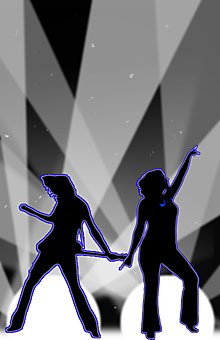There once was a time, not too long ago, when everyone just wanted to dance and do the hustle.
The disco era marked a change in the music industry, bringing 4/4 beat patterns and electronica into clubs and discotheques. While disco never completely died, it’s been mostly underground like a mole for quite some time. Electronic dance records haven’t driven mainstream kids to fanatic levels since the 1970s, but it looks like disco-type electronica is resurfacing in large amounts.
Disco house is No. 62 out of 66 on the Myspace.com “”Top Genre”” list, boasting 16,637 bands, while electronica and techno take 15th and 16th place with a combined 149,587 groups.
Whether it’s apparent in catchy backbeats, like some songs from electronic sensations Basement Jaxx, or in something as obvious as a name, like Panic! At The Disco, the disco theme of heavy beats and electronic sounds is an underlying brick in our cultural wall.
“”People want to forget about all the shitty things going on in the world and that Bush is still in office,”” said James Hudson, a local music critic and the creator of TucsonScene.com. “”Ignorant dancing is bliss!””
As John Travolta illustrated in “”Saturday Night Fever,”” many of disco’s main followers were regular working-class people trying to break free of social constraints.
Lately many pop-rock bands have mixed disco with other genres to create a sound that is both retro and fresh. Under the Influence of Giants is a band that recently released its first self-titled album on Island Records. The group looks like a band of brothers from “”The Royal Tenenbaums,”” and the song “”Mama’s Room”” sounds like a mix of The Bee Gees (named as one of their influences) and Maroon 5. Their music video for the song is a staple on MTV, and VH1’s morning shows feature the band in Partridge Family costumes.
Another current band that has found recent success with the use of synthesized dance-pop background music is The Pink Spiders. Dressed like confused kids from the early 1980s (unsure whether they should dress in ’70s or ’80s trends), their newest album Teenage Graffiti boasts songs with titles like “”Modern Swinger”” and “”Little Razorblade.””
They seem to be younger copycats of Head Automatica, whose 2004 debut Decadence could be considered the first clue that popular culture would be enjoying disco-like music in the future. Head Automatica’s hit “”Beating Heart Baby”” boasts synthesizers, a drum machine, and the vocals from the former frontman of Glassjaw as their recipe for dance-pop success.
“”Disco started with heavy beats and synthesizers, electronic music and lots of provocative vocals because Donna Summer’s vocals were very breathy,”” said Terry Marshall, a former music writer for the San Francisco Chronicle and critic of 28 years. “”It coincided with the advent of gay liberation, so there were a lot of provocative lyrics to dance songs.””
The British pop group Goldfrapp has been releasing hits since 2000, with sultry vocals similar to Donna Summer, the femme fatale who started American disco. Goldfrapp’s single “”Strict Machine”” is featured in the Verizon Wireless television commercial for their new “”Chocolate”” phone, another benchmark for the disco revival in the mass media.
Along with the people who embraced disco were the people who violently shoved it away. In the 1970s, T-shirts with the slogan “”Disco Sucks”” were prevalent among people who were still in love with classic rock and saw disco as gay.
“”Gay liberation was definitely linked with disco.”” Marshall said. “”I know in San Francisco you would walk down the streets and constantly hear disco music coming out of gay bars.””
One anti-disco event, held in 1979, was called “”Disco Demolition Night.”” Disco records were blown up between White Sox Doubleheader baseball games, and the festivities almost caused a riot, forcing the team to forfeit the second game.
“”There were not a lot of careers made from disco. There were people who had huge one-hit wonders, and after disco became popular, other artists tried to cash in on the disco bandwagon with disco songs,”” Marshall said.
That proves to be a cautionary tale for bands and musicians hoping to catch a break with the disco scene. The affections of mass groups of people are fickle and erratic. It is unlikely that trendy musicians will be able to consistently maintain their target audience for extended periods of time.
“”The Reagan-era conservative mood, Izods and New Wave replaced flared jeans and ‘The Hustle,'”” Hudson said.
History repeats itself, especially when it comes to the recycling of trends. Based on the chronological order of trends, musicologists can act somewhat like weathermen and predict the future of mainstream music.
It looks like the poppy world of electric sounds will ring in the atmosphere for about as long as trends tend to last. It is safe to say that something else will replace this type of music, and judging from the past, it will probably be a new wave of punk rock. Depending on your stylistic persuasion, this is either good news or sad reality.









